
I. Introduction: How Ethics and Profit Collide
Imagine a society where the pursuit of profit collides with our most fundamental rights—those enshrined in the Constitution itself.
For years, the prison-industrial complex has blurred the line between punishment and profit, creating a machine that thrives on mass incarceration. At its core lies an unsettling question: What happens when the incarceration of human beings becomes a business model?
Milton Friedman, the influential economist, famously argued that the primary responsibility of corporations is to maximize profit within the “rules of the game”—the laws and regulations set by society. While his philosophy revolutionized modern capitalism, it also revealed a dangerous flaw:
What if the ‘rules’ themselves could be manipulated—shaped by those in power to serve their own interests, rather than uphold justice or protect society?
An increasing number of Americans are recognizing this harsh reality as they witness politicians amassing wealth through practices like insider trading—actions that are illegal for others but permissible for them, thanks to the self-serving rules they create and enforce.
Less visible but equally insidious, the manipulation of America’s prison-industrial complex has transformed a system originally intended to deliver justice into one engineered for exploitation, driven by systemic corruption that prioritizes profit over fairness and rehabilitation.
The Rules Can Be Rigged
This systemic corruption is not a hypothetical concern; it is a reality entrenched in laws and policies across the United States. Corporate interests have demonstrated a troubling ability to shape the justice system for their own gain. For instance, Arizona’s SB1070, the infamous “show me your papers” law, was heavily influenced by private prison operators eager to profit from detaining undocumented immigrants. Similarly, in Georgia, laws exempting the Department of Corrections (GDC) from audits and transparency requirements have fostered an environment rife with financial impropriety and unchecked neglect.
Within Georgia’s prisons, corruption runs deep. Warden Brian Adams of Smith State Prison turned his facility into a RICO operation, using his authority for personal gain. No-bid contracts for health care, maintenance and other services suggest kickbacks and financial mismanagement, further eroding public trust. These practices illustrate how rules are manipulated to benefit the powerful while exploiting the powerless.
In the 20th century, economist Milton Friedman revolutionized modern capitalism with a straightforward principle: the primary responsibility of corporations is to maximize profit within the “rules of the game”—the laws and regulations set by society. His philosophy, outlined in his seminal works and widely embraced by the private sector, framed profit-making as not just a goal but an ethical obligation.
The question we aim to answer today is: How deep does this corruption truly run? Was Brian Adams the only warden to operate a RICO scheme, or is this systemic? Most importantly, how can we fight back against this entrenched corruption?
II. Milton Friedman’s Framework and Its Influence

What happens when those “rules of the game” are written, manipulated, or enforced by the very entities that stand to profit? This question lies at the heart of the prison-industrial complex—a system where the lines between justice, ethics, and capitalism blur into a framework designed to prioritize financial gain over fairness, rehabilitation, and public safety.
Privatization and the Pursuit of Profit
Friedman’s philosophy found fertile ground in the privatization boom of the 1980s and 1990s. Government services, including prisons, were increasingly outsourced to private companies under the assumption that market competition would improve efficiency and reduce costs. But in practice, privatization often led to cost-cutting measures that compromised safety, reduced oversight, and prioritized profit over service quality.
Private prison companies like CoreCivic and GEO Group quickly became central players in the justice system, lobbying aggressively for contracts and policies that guaranteed their profitability. Bed quotas—contracts requiring states to maintain minimum prison occupancy rates—became a striking example of how “rules” were shaped to serve corporate interests. These quotas penalized states for reducing incarceration, even as crime rates fell, locking the justice system into a cycle of mass incarceration.
This profit-driven influence extends beyond prison walls. Parole and probation industries exploit individuals under supervision through crushing fees for electronic monitoring, drug testing, and mandatory programs. These obligations, enshrined into law, ensure a continuous revenue stream for private contractors while trapping vulnerable individuals in cycles of financial insecurity. Lawmakers, tempted by campaign contributions, rarely question the ethical implications of these policies, further embedding profit motives into the justice system.
The Rules as a Tool for Exploitation
Friedman’s assertion that profit maximization is ethical assumes that the rules exist to safeguard public welfare. But within the prison-industrial complex, those rules are crafted and manipulated by the very entities that profit from incarceration. Instead of serving justice, they ensure corporate gains at the expense of rehabilitation, public safety, and fairness.
Consider policies like mandatory minimum sentences and three-strike laws. While marketed as tough-on-crime measures, these laws effectively funnel more people into prisons for longer periods, ensuring a steady stream of “clients” for private facilities and their contractors. Even Georgia’s exemption of the Department of Corrections (GDC) from audits and transparency requirements exemplifies how the system is designed to shield profiteers from scrutiny.
One egregious example is the “Kids for Cash” scandal in Pennsylvania, where judges accepted kickbacks for sentencing juveniles to private detention centers. This wasn’t an isolated incident—it was a symptom of a system where the rules themselves are written to benefit those in power. Similarly, Georgia’s use of exorbitant fees for parole supervision and electronic monitoring traps individuals in debt, leading to re-incarceration for minor infractions.
The consequences of rule manipulation are systemic. The justice system becomes a tool of exploitation rather than a means of rehabilitation or public safety. Private contractors, prison officials, and lawmakers profit while individuals and communities bear the brunt of a system designed not to serve justice but to sustain itself through suffering.
The Ethical Dilemma
Friedman’s vision of ethical profit relied on robust regulations and oversight to prevent exploitation. But in the prison-industrial complex, those safeguards are either absent or deliberately weakened. The result is a system where success is measured in filled cells, shattered lives, and perpetuated suffering.
This isn’t merely a policy failure—it’s a moral one. By commodifying incarceration, the prison-industrial complex has eroded the foundational principles of justice it was meant to uphold. As long as the rules remain rigged in favor of profit, the human cost of this system will continue to rise unchecked.
Through lobbying, campaign contributions, and strategic manipulation of laws, the prison-industrial complex has crafted a system that prioritizes corporate gains at the expense of fairness, public safety, and human dignity. This systemic exploitation represents a profound ethical failure—one that demands urgent reform.
The Human Cost of a Profit-Driven Justice System: Warren Douglas’s Story
Warren Douglas’s tragic story illustrates how profit-driven policies entangle individuals in cycles of incarceration for reasons that have little to do with public safety or justice. After serving 21.5 years in prison for an accidental shooting, Warren was paroled in 2007. He found a job and began rebuilding his life, but like many Americans, he fell victim to the Great Financial Crisis. Struggling to make ends meet, he fell behind on victim impact fees—a $190 financial obligation required as a condition of his parole.
Instead of receiving support or flexibility to address his economic hardship, Warren’s parole was revoked. In 2009, he was sent back to prison, where he remained for 16 years before finally being released on parole again. His violation? Failing to pay a small fee, a financial burden exacerbated by the very conditions that made reintegration difficult. Warren served almost as much time for a financial violation as for the original crime itself.
This isn’t just a story of personal tragedy; it’s a reflection of a justice system that prioritizes profit over rehabilitation. Victim impact fees, along with other financial penalties, are often funneled into state budgets or private contractor accounts, creating a revenue stream at the expense of individuals like Warren. Instead of helping him reintegrate into society, the system punished him for his poverty, turning his inability to pay into a justification for indefinite incarceration.
Warren’s story underscores the broader failures of a justice system built on financial exploitation. The manipulation of “rules” to prioritize profit doesn’t just harm individuals—it perpetuates a cycle of poverty, incarceration, and systemic injustice. His case is a stark reminder of why reform is urgently needed.
III. Corruption and Kickbacks in the System
The intersection of profit and incarceration doesn’t just incentivize the expansion of the prison-industrial complex—it actively corrupts the system. From judicial misconduct to shady deals by prison officials, the system is rife with examples of individuals and institutions exploiting their positions for personal or financial gain. These practices perpetuate cycles of injustice while undermining public trust in the justice system.
Judicial and Legal Corruption

While the “Kids for Cash” scandal in Pennsylvania is a well-known example of judicial corruption, Georgia has faced its own significant instances of misconduct within the legal system.
Former Judge William “Allen” Wigington’s Corruption Convictions
In 2021, William “Allen” Wigington, the former Chief Magistrate Judge of Pickens County, Georgia, was convicted on multiple charges, including racketeering, forgery, and theft by taking. Investigations revealed that Wigington had misused his position for personal financial gain, engaging in fraudulent activities that undermined public trust in the judiciary.
Alapaha Judicial Circuit Corruption Scandal
The Alapaha Judicial Circuit in southern Georgia was embroiled in a corruption scandal involving several judicial officials. In 2008, former Judge Brooks E. Blitch III and others were indicted on charges including fraud and extortion. The indictments highlighted systemic corruption, with officials exploiting their positions for personal benefit, leading to a significant breach of judicial integrity.
Paulding County District Attorney’s Office Scandal
In 2019, Paulding County District Attorney Donald Richard “Dick” Donovan was indicted on charges including bribery and violation of oath by a public officer. The charges stemmed from allegations that Donovan attempted to influence a colleague in exchange for sexual favors, representing a severe abuse of power within Georgia’s legal system.
These cases underscore the vulnerabilities within Georgia’s judicial and legal systems, where individuals in positions of authority have engaged in corrupt practices, eroding public confidence in the pursuit of justice.
Prison Officials and Contractors
Corruption within the prison system itself is equally pervasive. In Mississippi, Corrections Commissioner Christopher Epps pleaded guilty to taking more than $1.4 million in bribes from contractors in exchange for lucrative no-bid contracts. This type of corruption isn’t limited to one state. Across the country, prison officials have been caught accepting kickbacks for services ranging from food supply to facility maintenance.
Corruption within Georgia’s prison system extends beyond isolated incidents, revealing systemic issues that compromise the integrity of the Department of Corrections (GDC).
Warden Brian Adams and Smith State Prison
At Smith State Prison, Warden Brian Adams was arrested and charged with racketeering, bribery, making false statements, and violating his oath as a public officer. Investigations revealed that Adams was allegedly involved in a contraband smuggling operation, accepting bribes connected to gang activities within the prison. This case underscores the deep-seated corruption that can flourish in environments lacking adequate oversight.
Assistant Commissioner Ahmed Holt and GDC Oversight Failures
Assistant Commissioner Ahmed Holt, responsible for overseeing facilities like Smith State Prison, has faced scrutiny for the systemic issues under his purview. A federal judge imposed fines and appointed a monitor over a Georgia prison, citing the GDC’s failure to improve deplorable conditions, which reflects broader administrative failures within the department.
Systemic Corruption Among Prison Staff
Since 2018, at least 360 GDC employees have been arrested on charges related to contraband smuggling, with an additional 25 fired for similar allegations but not arrested. Notably, nearly 80% of those arrested were women, many under the age of 30, highlighting vulnerabilities in hiring and training practices. This pervasive corruption among staff facilitates the operation of criminal enterprises within prisons, exacerbating violence and undermining rehabilitation efforts.
Judicial Findings on GDC’s Non-Compliance
In response to lawsuits challenging inhumane conditions, federal judges have found the GDC in contempt for failing to implement court-ordered reforms. For instance, the GDC agreed to improve conditions in the Special Management Unit but failed to comply, leading to judicial sanctions. These findings highlight the department’s persistent non-compliance with mandated reforms, perpetuating environments where corruption and abuse can thrive.
These instances illustrate a pattern of corruption and administrative failure within Georgia’s prison system, where lack of oversight and accountability enables misconduct among officials and staff, ultimately compromising the safety and rights of inmates.
Corruption Within the Georgia Department of Corrections: A Systemic Issue
The Georgia Department of Corrections (GDC) has long been plagued by allegations of corruption, misconduct, and criminal enterprises, raising questions about the integrity of its operations and its relationships with external contractors.
Operation Skyhawk: A Window into Corruption
In March 2024, Operation Skyhawk—a sweeping, multi-state investigation—uncovered a sophisticated criminal network involving civilians, inmates, and GDC staff. The operation revealed:
• 150 arrests, including 8 GDC employees.
• 1,000+ criminal charges, ranging from contraband smuggling to money laundering.
• Confiscation of $7 million in contraband, further exposing the depth of corruption within the system.
Staff Complicity in Criminal Activities
Over the past six years, hundreds of GDC officers have been arrested or fired for criminal activities and misconduct:
• Charges have included contraband smuggling, extortion, violence, and even sexual assault.
• In February 2023, the Warden of Smith State Prison was arrested under Georgia RICO charges for leading a drug-smuggling conspiracy.
• A 2016 FBI operation revealed widespread public corruption across 11 GDC facilities, with officers using law enforcement credentials to protect drug deals involving methamphetamine and cocaine.
No-Bid Contracts and Allegations of Kickbacks
While no specific external contractors have been publicly implicated, there is significant anecdotal evidence suggesting that no-bid contracts and kickbacks are routine within the GDC:
• Allegations include paid trips, private hunting lodge invitations, and vacations provided to GDC officials by contractors as part of “doing business.”
A System Built on Corruption
The culture of corruption within the GDC creates an environment where unethical practices are not only tolerated but thrive. From high-profile criminal enterprises to opaque procurement processes, the system is rigged to benefit a select few at the expense of taxpayers, inmates, and public trust.
While proving specific allegations may be challenging, the documented misconduct highlights a broader systemic issue. Without transparency, accountability, and external oversight, these practices are likely to persist, further eroding confidence in Georgia’s prison system.
No-Bid Contracts and Hidden Kickbacks
One of the most insidious ways the prison-industrial complex operates is through no-bid contracts, which often lead to inflated costs and subpar services. In Georgia, many prison maintenance contracts are awarded without competitive bidding, raising questions about kickbacks and financial mismanagement. These contracts often include hidden fees and inflated costs, further burdening taxpayers while delivering minimal benefits to the prison system.
For example, contractors responsible for providing meals, healthcare, and facility maintenance often charge exorbitant rates for substandard services. This practice not only wastes public funds but also perpetuates inhumane conditions for inmates. Reports of spoiled food, inadequate medical care, and unsafe living environments are common in facilities across Georgia, all while private contractors profit handsomely from taxpayer dollars.
Spotlight: Ranger Mechanical and the Georgia Department of Corrections
Ranger Mechanical, a Georgia-based company, holds a significant no-bid contract with the Georgia Department of Corrections (GDC), raising serious questions about transparency and accountability in the state’s procurement practices. Ranger Mechanical specializes in facility maintenance and construction services, operating within a system that has long been criticized for its lack of oversight and ethical lapses.
Concerns in Contracting
• No-Bid Contracts: Ranger Mechanical’s multi-million-dollar contract with the GDC was awarded without competitive bidding, a practice that eliminates market competition and fosters an environment ripe for financial mismanagement and potential corruption.
• Potential Conflicts of Interest: Reports suggest that GDC officials have benefited personally from perks such as paid trips, vacations, and other incentives tied to contractor relationships. While specific allegations regarding Ranger Mechanical remain unproven, these practices highlight systemic vulnerabilities in the contracting process.
• Broader Implications: The awarding of no-bid contracts to companies like Ranger Mechanical not only strains taxpayer resources but also perpetuates the cycle of inefficiency and corruption within Georgia’s prison system. This lack of accountability exacerbates the already dire conditions for inmates and staff, contributing to a system that prioritizes financial gain over justice and rehabilitation.
A Call for Transparency
The relationship between Ranger Mechanical and the GDC underscores the urgent need for comprehensive reform in how contracts are awarded and monitored. Increased transparency and independent audits are essential to ensure taxpayer dollars are used responsibly and ethically, particularly within a system as critical as corrections. Without these measures, the GDC’s reliance on opaque practices will continue to undermine public trust and perpetuate the prison-industrial complex’s worst excesses.
How Corruption Shapes Policy
Corruption within the justice system doesn’t just result in isolated incidents of wrongdoing—it shapes policies that perpetuate injustice. Lobbyists for private prison companies and contractors pour millions into political campaigns and lobbying efforts, ensuring that laws and regulations are tailored to benefit their bottom line. This includes mandatory minimum sentencing laws, “three-strike” policies, and parole requirements that prioritize financial obligations over rehabilitation.
Even when corruption is exposed, accountability is rare. Officials and contractors caught engaging in corrupt practices often receive lenient sentences or quietly resign without facing significant consequences. Meanwhile, the systemic issues that allow these practices to thrive remain unaddressed, perpetuating cycles of exploitation and abuse.
IV: The Economics of Incarceration
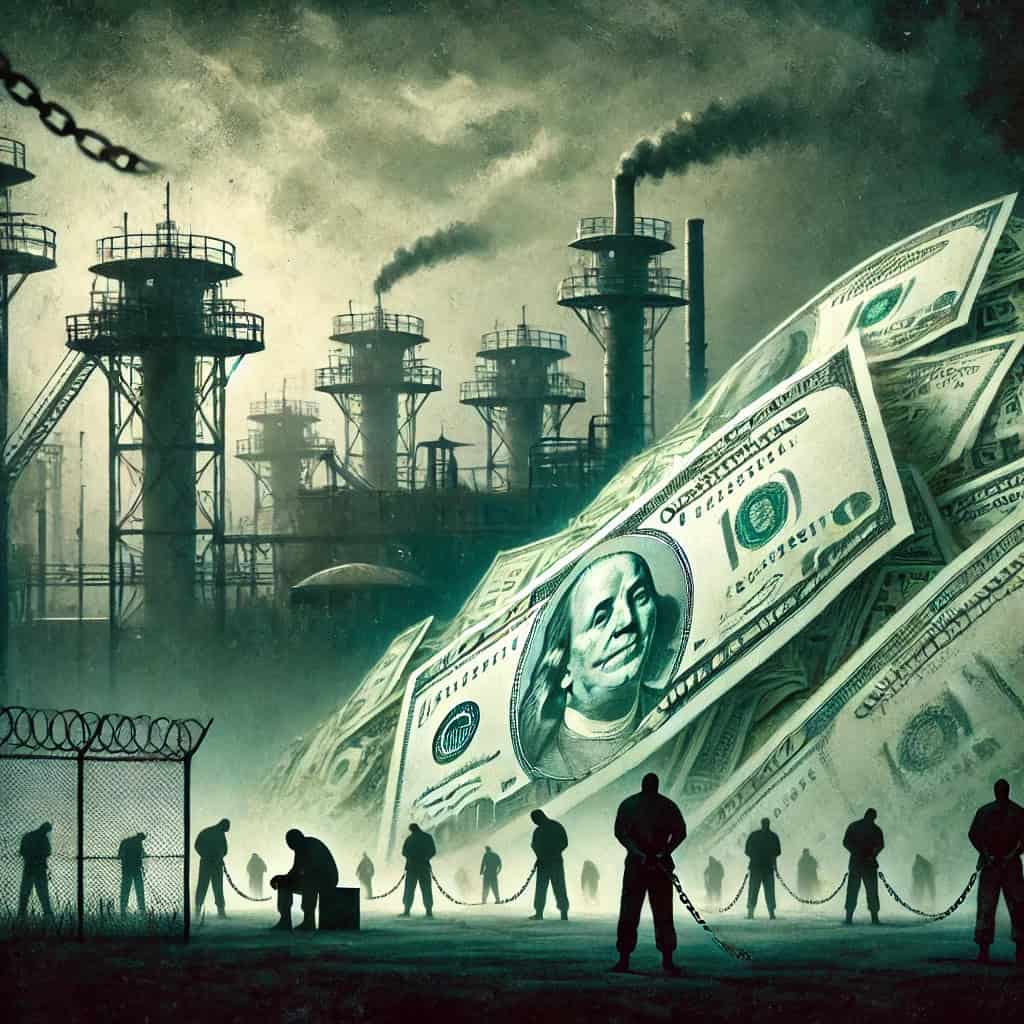
The prison-industrial complex is not just about locking people up—it’s about extracting every possible dollar from those behind bars and their families. In Georgia, this profit-driven system extends beyond the walls of correctional facilities to include lucrative contracts, inflated fees, and taxpayer dollars funneled into inefficient systems.
Revenue Streams: Profiting Off of Desperation
Georgia prisons generate substantial income through contracts for essential services like food, healthcare, commissary, and telecommunications. For example:
• The Georgia Department of Corrections (GDC) reported $24.6 million in commissary sales, with $18.2 million in revenue and a profit margin of nearly $12 million.
• Prison telephone services earned the GDC $12.2 million in gross revenue, with $8.4 million in profit after minimal operating costs.
These profits don’t return to taxpayers. Instead, they’re funneled into discretionary funds often used for staff perks, further removing accountability from a system already plagued with corruption. Meanwhile, inmates and their families bear the brunt of these costs, with phone calls priced exorbitantly and basic necessities like hygiene products marked up several times over retail value.
Surviving on Ramen and Markups – The Commissary Trap
In Georgia prisons, survival often depends on the commissary. While it’s meant to provide inmates with access to supplemental food and necessities, it has become a symbol of systemic exploitation. The commissary prices inmates face are vastly inflated, leaving many with no choice but to turn to families for financial support—or go without.
The Price of Survival
For prisoners, the commissary isn’t a luxury—it’s a lifeline. The quality and quantity of meals served by the Georgia Department of Corrections (GDC) have significantly declined in recent years. Meals are often meager and nutritionally deficient, forcing inmates to rely on commissary purchases just to avoid hunger. However, the prices in the prison commissary make survival a costly burden:
• Ramen Noodle Soup: While it sells for $0.15 at Walmart, inmates pay $0.79 per pack—a markup of over 400%.
• 3 oz Pack of Chicken Meat: At Walmart, a profit-driven price is around $2.50, but inmates pay $4.21 in Georgia prisons.
• Off-Brand Chili Pouch: With no recognizable market equivalent, it’s sold for $4.22—a price that feels arbitrary and exploitative.
A System of Dependency
The high commissary prices highlight a troubling reality: Georgia prisoners are being forced into dependency on overpriced goods. Many inmates receive little to no financial support from the outside, leaving them unable to purchase essential items like food, hygiene products, or stationary. Those who can afford to buy commissary items often do so at the expense of their families, who are already financially burdened.
For those who cannot afford commissary, the consequences are stark: malnutrition, reliance on black-market trade within the prison, and a diminished sense of dignity.
Where Does the Profit Go?
Unlike what some might expect, the profits from these inflated prices don’t go toward rehabilitative services or taxpayer relief. Instead, these revenues flow into GDC-controlled slush funds used at the discretion of prison administrators. Funds are reportedly spent on staff perks like parties and celebrations rather than improving inmate conditions or funding critical programs.
In 2023 alone, the GDC reported $24.6 million in gross commissary sales, yielding $18.2 million in profits after operating costs. These staggering figures underscore how the commissary system has become a tool for exploitation rather than support.
The Bigger Picture
The commissary system exemplifies how Georgia’s prison-industrial complex profits from incarceration at every turn. Prisoners, already stripped of freedom, are further exploited through inflated prices for the most basic items needed to survive. It’s a system that doesn’t just punish—it profits.
Addressing this issue requires not just price adjustments but a broader reevaluation of the priorities driving Georgia’s prison system. Without change, the commissary will remain a symbol of the systemic injustices inmates endure every day.
Parole and Probation: A Hidden Tax on Freedom
For parolees and probationers, financial exploitation doesn’t end at release. Georgia’s probation system imposes steep fees for supervision, mandatory programs, and electronic monitoring devices. These charges are particularly burdensome for those convicted of sex offenses, who must pay for constant monitoring, counseling sessions, and other mandated services—often at inflated rates.
These policies trap individuals in cycles of debt, making it difficult to reintegrate into society. For those unable to pay, revocation of parole becomes a real possibility, leading to unnecessary re-incarceration and perpetuating the profit-driven system.
The Taxpayer Burden: A Rigged System
Despite these revenue streams, taxpayers continue to foot the bill for Georgia’s bloated prison system. Privatized services are often more expensive and less efficient than public alternatives, with companies prioritizing profits over effective service delivery. Healthcare, for example, is a $2.4 billion no-bid contract plagued with underperformance and minimal oversight, leaving inmates without adequate care while draining public resources.
This system of exploitation doesn’t just harm inmates and their families—it burdens every Georgian by prioritizing corporate profits over public safety and rehabilitation.
V: Labor Exploitation in Prisons
Georgia’s prisons aren’t just places of punishment—they’re factories for profit, built on the backs of unpaid and exploited labor. This system, often touted as rehabilitative, is in reality a cornerstone of the prison-industrial complex, generating significant revenue at the expense of human dignity.
Unpaid Labor: A System of Modern Slavery

Georgia stands out as one of the few states where inmates are not paid for their work. Each day, thousands of incarcerated individuals perform essential tasks such as manufacturing furniture, cultivating crops, and preparing meals—without earning a single cent. The justification? It’s considered part of their punishment.
Organizations like Georgia Correctional Industries (GCI) capitalize on this unpaid labor. Employing over 1,000 inmates daily, GCI runs 21 manufacturing plants and 13,000 acres of farmland, producing goods ranging from furniture to food. While GCI markets itself as a self-sustaining enterprise, its practices effectively rival offshore sweatshops in their exploitation. By statute, 25% of GCI’s profits are allocated to employee bonuses, while the remaining 75% goes into Georgia’s General Fund. Inmates, meanwhile, receive nothing.
The Cost of Free Labor
This exploitation comes at a significant cost—not just to inmates but to society at large:
• Displacement of Free Market Jobs: By providing businesses and government agencies with cheap goods, prison labor undercuts fair-wage jobs in the free market.
• Perpetuation of Poverty: Without compensation, inmates leave prison with no financial resources, further entrenching cycles of poverty and recidivism.
• Exploitation of Families: Inmates’ families must cover the cost of basic necessities through commissary purchases, further enriching the prison system.
The Ethical and Moral Failure
While prison labor is often framed as an opportunity for skill-building, Georgia’s system strips it of rehabilitative value by denying inmates any form of compensation. This lack of investment in rehabilitation undermines the very purpose of incarceration—preparing individuals for reintegration into society.
Georgia’s unpaid labor practices aren’t just economically exploitative—they’re morally indefensible. By turning incarceration into a cost-saving mechanism and profit-generating industry, the state perpetuates a system that values profit over humanity.
Georgia’s Contraband Economy: A System Fueled by Desperation
In Georgia’s prison system, contraband smuggling has evolved into a dangerous and highly lucrative underground economy. The lack of pay for inmate labor and exorbitant prices for basic necessities in commissaries create a perfect storm, driving many incarcerated individuals to seek alternative means of survival. This desperate situation is further exacerbated by systemic corruption among staff, who often play a pivotal role in the contraband trade.
Contraband: A Survival Mechanism
Contraband items—ranging from cell phones and tobacco to drugs and weapons—are in high demand among inmates. Cell phones, for instance, are often used to communicate with family, arrange financial support, or even report abuses. However, with prices for contraband phones reaching as much as $2,000 each, they are far out of reach for most inmates unless smuggled through corrupt channels.
For many inmates, contraband is not a luxury but a necessity. Basic hygiene items like soap or toothpaste can be priced exorbitantly in commissaries, leaving those without outside financial support struggling to maintain dignity. In some cases, contraband is the only way to obtain items like extra food or medical supplies that are inadequately provided by the system.
The Role of Staff in the Contraband Trade
The GDC has publicly acknowledged that hundreds of staff members have been arrested or dismissed for smuggling contraband in the past six years. In Operation Skyhawk, an investigation into corruption within the Georgia Department of Corrections, 150 arrests were made, including 8 GDC employees. This crackdown revealed a network where prison staff facilitated the trade, often in exchange for bribes.
The profits from this illicit economy are staggering. Inmates pay inflated prices for contraband items, enriching both corrupt staff and the external suppliers who feed the system. These activities thrive in part because understaffing leaves critical gaps in security, making smuggling operations easier to conduct and harder to detect.
The Human Cost
Contraband doesn’t just disrupt prison order—it fuels violence. Rivalries over smuggling routes and contraband control often escalate into stabbings or murders. Gangs, already dominant in many Georgia prisons, use contraband profits to strengthen their influence, creating a cycle of violence and exploitation that further undermines rehabilitation efforts.
Systemic Failures
The existence of such a robust contraband economy highlights systemic failures within Georgia’s correctional system. While understaffing, poor pay, and lack of oversight create opportunities for corruption, the broader issue lies in a profit-driven system that neglects the basic needs of inmates. Without meaningful reforms—such as fair wages for inmate labor, lower commissary prices, and stricter oversight of staff—contraband will remain a lifeline for some and a tool for exploitation for others.
VI: The Role of Over-Criminalization

In Georgia’s prison system—and across the United States—the rules governing incarceration have not only been written but actively shaped by those who stand to profit from mass incarceration. Overcriminalization, fueled by policies like mandatory minimum sentences, three-strike laws, and the criminalization of poverty, has become a cornerstone of the prison-industrial complex. These policies ensure a steady pipeline of inmates, benefiting corporations and contractors at the expense of justice and society.
Mandatory Minimums and Three-Strike Laws: The Perfect Recipe for Profit
Mandatory minimum sentencing laws, often promoted under the guise of being “tough on crime,” remove judicial discretion and impose fixed sentences for specific offenses. While these laws were initially framed as a means to deter crime, their real effect has been to inflate prison populations dramatically.
For example:
• Drug offenses: Non-violent drug offenders are disproportionately affected by mandatory minimums. A person caught with a minor amount of a controlled substance can receive a sentence harsher than that of some violent offenders.
• Three-strike laws: These policies, which mandate life sentences for repeat offenders, often incarcerate individuals for relatively minor third offenses, such as petty theft or drug possession.
The beneficiaries of these policies are not communities or crime victims but the corporations and contractors tied to the prison system. With every additional inmate, companies that provide services—like food, healthcare, and maintenance—profit. Ranger Mechanical, for example, continues to secure lucrative contracts with Georgia prisons, benefiting from the steady stream of incarcerated individuals.
Criminalization of Poverty: A System Designed to Trap the Vulnerable
The manipulation of laws to criminalize poverty has further exacerbated mass incarceration. Consider these mechanisms:
• Cash bail systems: In Georgia and beyond, individuals arrested for minor offenses often remain incarcerated simply because they cannot afford bail. This practice disproportionately impacts low-income individuals, trapping them in jail for months—or even years—before their case is heard. The extended incarceration generates more profit for the system, as each additional day adds to the need for services like commissary, healthcare, and maintenance.
• Probation violations: People on probation face stringent conditions, such as mandatory fees, drug tests, and participation in programs run by private contractors. Minor infractions, like missing a payment or being late to a meeting, can lead to re-incarceration. This revolving door ensures that the system maintains a constant supply of inmates while burdening individuals with unpayable debts.
Take the story of Warren Douglas, who spent over a decade in prison for failing to pay $190 in victim impact fees. Cases like his highlight how the system criminalizes poverty, effectively turning financial hardship into a crime punishable by lengthy incarceration.
Profiting from Overcriminalization
The deliberate expansion of policies like mandatory minimums and the criminalization of poverty didn’t happen by accident. These “rules” were shaped by lobbying groups and industry stakeholders who saw the economic potential in locking people up. Consider:
• Private prison companies lobbying for stricter sentencing laws to ensure their facilities remain full.
• Parole and probation contractors advocating for policies that increase their client base, regardless of whether those clients pose a threat to society.
• Healthcare providers profiting from no-bid contracts: The GDC recently awarded a $2.4 billion healthcare contract without competitive bidding. This massive expenditure raises serious concerns about accountability and efficiency, as taxpayer dollars flow into a system that consistently fails to meet basic medical care standards for inmates.
The rules themselves have been manipulated to prioritize profit over public welfare. By enacting laws that keep prisons full, the profiteers behind the prison-industrial complex have effectively monetized human suffering.
A System Engineered for Profit, Not Justice
The policies driving overcriminalization are not merely a failure of justice but an intentional design. They ensure that every facet of the system—prison beds, commissary goods, phone calls, probation fees—becomes a revenue stream. While these policies devastate individuals and communities, they create a windfall for corporations, contractors, and even government agencies.
The result? A society where incarceration is not a last resort but a business model. Instead of addressing root causes like addiction, poverty, and mental health, the system traps vulnerable people in an endless cycle of exploitation. Until these rules are rewritten to prioritize fairness and rehabilitation, the prison-industrial complex will continue to thrive—at the expense of justice, dignity, and humanity.
VII: Transparency and Accountability Failures
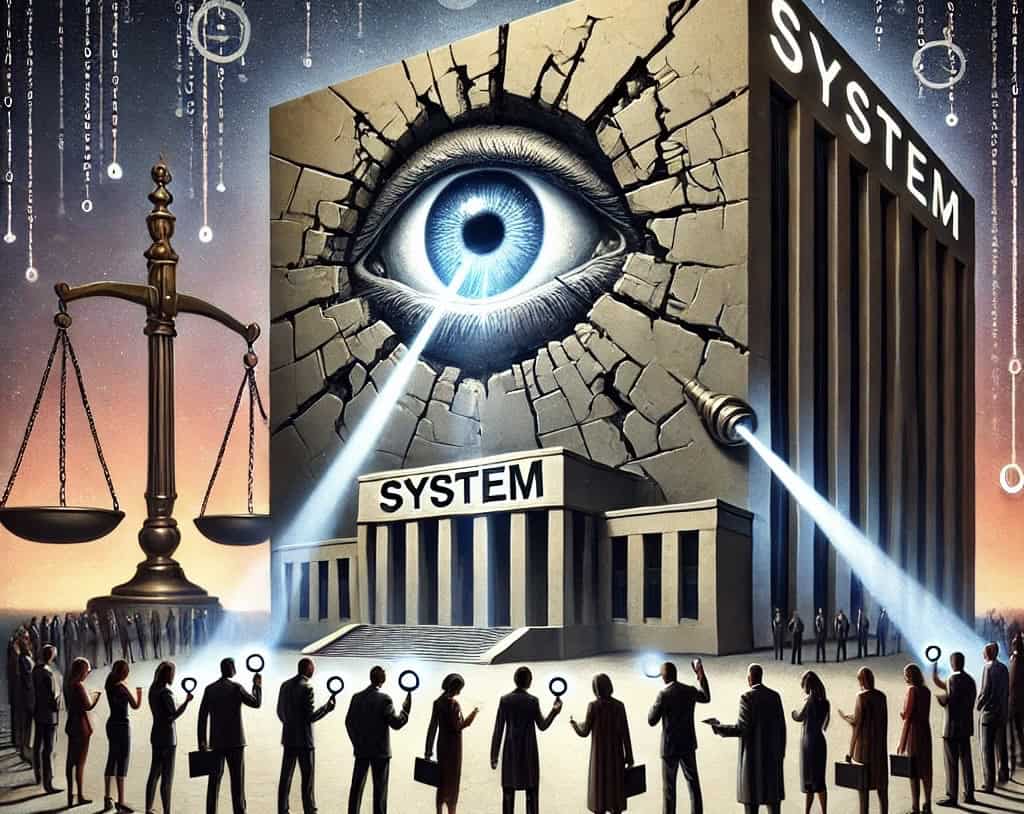
A system as vast and profit-driven as Georgia’s prison-industrial complex thrives not only on incarceration but also on a lack of oversight and accountability. Transparency is the bedrock of trust in any government institution, yet the Georgia Department of Corrections (GDC) has systematically evaded scrutiny, allowing corruption, mismanagement, and violence to flourish unchecked.
Lack of Oversight in Georgia
The GDC operates within a unique framework of legal exemptions that shields it from external audits and significant legislative oversight. Unlike other state agencies, the GDC is not subject to many of the transparency requirements that ensure public accountability. This lack of oversight creates a fertile ground for corruption and misconduct to go unnoticed.
• No-bid contracts: As previously noted, companies like Ranger Mechanical have secured lucrative no-bid contracts with the GDC. These arrangements often bypass competitive bidding processes, raising questions about favoritism, kickbacks, and financial mismanagement.
• Untraceable expenditures: Profits from inmate commissary, telephone services, and other revenue streams are funneled into discretionary accounts. These funds are often used for staff perks, such as parties and trips, rather than reinvested into improving inmate conditions or public safety.
• Shielded from audits: Georgia’s laws exempting the GDC from certain audit requirements make it difficult for taxpayers or lawmakers to follow the money trail or hold officials accountable.
The DOJ’s Struggle for Transparency
The U.S. Department of Justice (DOJ) launched an investigation into Georgia’s prison system in 2021, citing widespread reports of violence, neglect, and constitutional violations. However, their efforts to uncover the truth were met with resistance at nearly every turn.
• Obstructed investigations: The DOJ faced significant hurdles in obtaining accurate records of inmate deaths, incidents of violence, and healthcare provision. In many cases, the GDC either delayed responses or provided incomplete data.
• Litigation for records: The DOJ was forced to take legal action to compel the GDC to release records critical to its investigation. This resistance underscores the agency’s efforts to maintain secrecy, even in the face of federal scrutiny.
• Inconsistent reporting: The GDC’s public-facing statistics often omit or downplay incidents of violence and misconduct, creating a sanitized narrative that obscures the harsh realities of Georgia’s prisons.
Underreporting of Violence and Gang Activity
Perhaps the most damning aspect of the GDC’s transparency failures is its deliberate underreporting of violence and gang activity within its facilities. By concealing the full extent of these issues, the department protects its financial interests at the expense of safety and accountability.
• Inmate deaths: Since 2021, the GDC has ceased issuing public reports on inmate deaths. This practice not only violates the public’s right to know but also denies families the transparency they deserve when their loved ones die in state custody.
• Gang control: Gang activity is rampant in Georgia’s prisons, yet the GDC consistently downplays its prevalence. Rival gangs vie for dominance, while vulnerable inmates are forced to choose between joining gangs or enduring violence. The department’s failure to address this crisis exacerbates the cycle of violence and exploitation.
• Healthcare cover-ups: Reports of medical neglect and preventable deaths are often buried under administrative red tape, with no meaningful investigations or consequences. This lack of transparency allows contractors, like those managing prison healthcare, to operate with impunity.
The Cost of Concealment
The GDC’s lack of transparency is not merely a bureaucratic issue—it has real, devastating consequences. Without accurate reporting and accountability, systemic problems go unaddressed, creating a dangerous environment for inmates, staff, and the public. Furthermore, the secrecy surrounding financial operations enables corruption to flourish, siphoning resources away from rehabilitation and safety initiatives.
A System Designed to Evade Accountability
The prison-industrial complex thrives in darkness. By obstructing investigations, underreporting violence, and shielding itself from audits, the GDC ensures that its operations remain profitable and unchallenged. These failures of transparency are not accidental; they are the result of deliberate choices designed to protect the interests of those who benefit from mass incarceration.
Reforming Georgia’s prison system requires more than policy changes—it demands a commitment to transparency and accountability at every level. Without these safeguards, the cycle of exploitation and neglect will continue unabated, eroding public trust and perpetuating the injustices at the heart of the prison-industrial complex.
VIII. The Human Cost of Incarceration for Profit
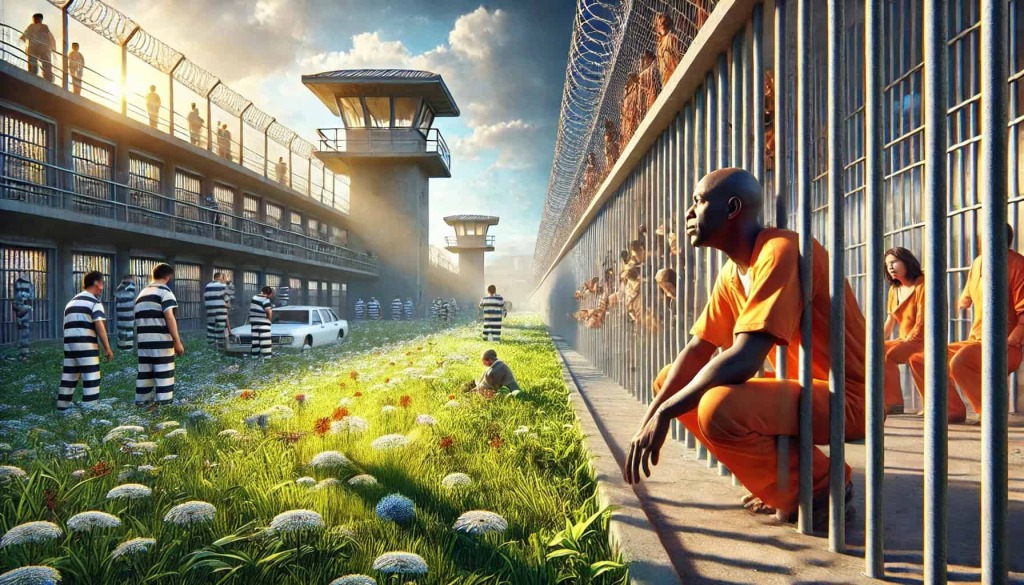
When the pursuit of profit becomes the driving force behind incarceration, the consequences are devastating, not just for the individuals trapped within the system but also for their families and communities. Georgia’s prison system exemplifies this tragedy, where neglect, violence, and systemic corruption have left a trail of shattered lives. Worse still, a troubling number of wrongful convictions suggest that the very foundation of justice is compromised, further perpetuating the suffering.
The Stories Behind the Statistics
1. Warren Douglas: A Life Sentence for Poverty
Warren Douglas’s story is a glaring example of how financial exploitation underpins incarceration. Sentenced to life for accidentally shooting a friend, Douglas was paroled after 21 years. However, when he was unable to pay $190 in victim impact fees during the Great Financial Crisis, his parole was revoked. Now, after 16 additional years of imprisonment for this minor infraction, Douglas was finally released on parole. His plight demonstrates how poverty, rather than crime, keeps individuals behind bars.
2. Mario Navarrete: Justice for a Soldier
A former U.S. soldier, Navarrete served his country in Iraq only to return home and face a life sentence for failing to report a crime. The actual perpetrator confessed, yet Navarrete received the same sentence. Two others involved in the incident were released years ago. Navarrete’s family continues to fight for his freedom, highlighting the systemic failure to consider context, service, and rehabilitation in sentencing. His case underscores how arbitrary and severe punishments can rob individuals of decades of their lives.
3. Bill Press: A Bureaucratic Nightmare
Bill Press’s story reflects the Kafkaesque reality of Georgia’s Department of Corrections (GDC). Taken back into custody without a warrant in 2018—14 months after his legal release—Press spent six years in prison fighting to prove his freedom was legitimate. This ordeal devastated his family emotionally and financially while exposing how administrative failures and poor oversight can lead to life-altering consequences.
4. Danyel Smith and Others: A Pattern of Wrongful Convictions
Danyel Smith’s ongoing battle to present new scientific evidence of his innocence is just one of many wrongful convictions in Georgia. Cases like his, alongside the exoneration of Terry Talley after 40 years of wrongful imprisonment, reveal the systemic issues within Georgia’s justice system. Evidentiary rules designed to make convictions easier have increased the risk of incarcerating innocent people, further inflating the prison population for profit.
The Ripple Effect on Families and Communities
The impact of incarceration extends far beyond prison walls. Families are forced to shoulder the financial burden of commissary costs, exorbitant phone fees, and the emotional toll of losing a loved one to the system.
• Financial Exploitation: Families pay inflated prices for basic necessities, with commissary items like ramen noodles costing five times their retail price. Even essential communication, such as phone calls, comes with exorbitant fees, draining family resources.
• Cycles of Poverty: Children of incarcerated parents face economic hardship, reduced educational opportunities, and emotional trauma. Studies show that neighborhoods with high incarceration rates suffer increased health problems, perpetuating cycles of poverty and instability.
• Community Destabilization: The mass incarceration of individuals—many of whom are wrongfully convicted or over-sentenced—erodes trust in the justice system and destabilizes communities, disproportionately affecting marginalized groups.
The Hidden Costs of Wrongful Convictions
The growing number of wrongful convictions in Georgia is not just a symptom of a flawed justice system but also evidence of how financial corruption influences incarceration rates. Laws that increase sentencing and change evidentiary rules have created an environment where convictions are easier to secure, whether justified or not.
The result is staggering: Georgia imprisons far more people per capita than other states and countries with similar populations. This disparity raises a critical question—are Georgians inherently more likely to commit crimes, or has the system been manipulated to sustain profit-driven incarceration?
The Human Toll of Profit-Driven Incarceration
When profit dictates the rules, the justice system’s purpose shifts from rehabilitation and fairness to exploitation and control. Georgia’s prisoners, many of whom are victims of systemic injustice, serve as cogs in a profit machine that benefits private contractors, government officials, and corporate interests. Meanwhile, their families and communities bear the brunt of a system that profits from suffering.
The cost of ignoring these stories is too great. Until the justice system prioritizes transparency, fairness, and humanity over financial gain, the cycle of exploitation will continue, leaving countless lives destroyed in its wake.
IX. The Broader Social Implications
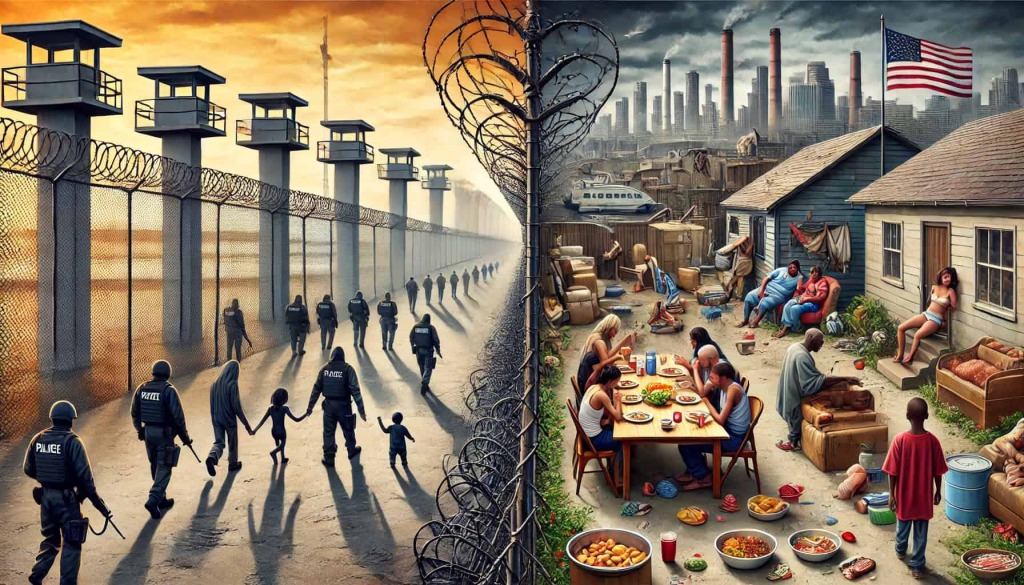
The prison-industrial complex’s impact extends far beyond prison walls, shaping communities and perpetuating cycles of poverty, violence, and inequality. When incarceration is driven by profit rather than rehabilitation, society as a whole pays the price. From the destabilization of families to the perpetuation of systemic inequalities, the broader social implications of this exploitative system cannot be ignored.
Public Safety and Recidivism: A Broken Cycle
High recidivism rates are often cited as evidence of the prison system’s failure to rehabilitate. In Georgia, however, recidivism isn’t just a failure—it’s a feature of a system designed to keep individuals ensnared.
• Profiting from Recidivism: For-profit companies thrive when individuals cycle in and out of incarceration. Services like probation, parole monitoring, and even mandatory drug testing ensure a steady flow of revenue. As a result, there is little incentive to implement programs that successfully reduce reoffending.
• Neglecting Rehabilitation: Rehabilitation programs, such as vocational training and mental health support, are chronically underfunded. Studies show that these initiatives significantly reduce recidivism rates, but their implementation would undercut the profitability of re-incarceration.
• Gangs and Violence: Within prisons, gangs fill the power vacuum created by inadequate staffing and oversight. These gangs extend their influence beyond the prison gates, recruiting new members and perpetuating cycles of violence in already vulnerable communities.
The system’s failures don’t just endanger inmates; they also jeopardize public safety. When individuals are released without the tools to reintegrate into society, they are more likely to reoffend, perpetuating a cycle that benefits those profiting from mass incarceration.
Marginalized Communities: The Intersection of Race, Poverty, and Mass Incarceration
The prison-industrial complex disproportionately affects marginalized communities, particularly communities of color. Georgia’s justice system exemplifies this inequity, where poverty and race often determine who gets incarcerated and who doesn’t.
• The Criminalization of Poverty: Georgia’s reliance on cash bail, exorbitant probation fees, and strict parole conditions disproportionately impacts low-income individuals. Many people remain incarcerated not because they are guilty, but because they cannot afford bail or pay fines.
• Targeting Communities of Color: Black and Hispanic individuals are incarcerated at far higher rates than their white counterparts, often for similar or lesser offenses. This systemic bias reflects broader racial disparities within the justice system and perpetuates cycles of poverty and disenfranchisement.
• Economic Toll: Incarceration devastates families and communities, stripping breadwinners from households, draining financial resources, and creating lasting trauma. Neighborhoods with high incarceration rates often experience increased poverty, reduced educational opportunities, and weakened social structures.
By disproportionately targeting marginalized communities, the prison-industrial complex not only perpetuates inequality but also deepens the socioeconomic divides that drive crime in the first place.
The Ripple Effect on Society
The broader social implications of mass incarceration extend beyond individual families and communities. The economic, social, and emotional toll reverberates across society, creating a less equitable and less safe world for everyone.
• Economic Costs: The financial burden of mass incarceration falls on taxpayers, who fund the $1.4 billion GDC budget, and on families, who pay inflated commissary and communication fees. Meanwhile, the broader economy suffers from the lost potential of individuals removed from the workforce.
• Erosion of Trust in Justice: The profit-driven nature of incarceration erodes public trust in the justice system, especially when stories of wrongful convictions and exploitation come to light. Communities lose faith in a system that prioritizes profits over fairness, creating a sense of injustice that undermines social cohesion.
• Perpetuating Inequality: Mass incarceration exacerbates existing inequalities, creating generational cycles of poverty and disadvantage. Children of incarcerated parents are more likely to face economic hardship, reduced educational opportunities, and involvement with the criminal justice system themselves.
The Need for Systemic Reform
The social implications of Georgia’s prison-industrial complex are far-reaching and deeply damaging. Addressing these issues requires systemic reform that prioritizes public safety, rehabilitation, and equity over profit.
• Investing in Communities: Redirecting resources from incarceration to education, healthcare, and job training can address the root causes of crime and reduce the need for incarceration.
• Rehabilitation Over Punishment: Expanding access to rehabilitation programs within prisons can reduce recidivism and help individuals reintegrate into society.
• Addressing Racial Disparities: Tackling systemic biases in policing, sentencing, and incarceration is critical to creating a more equitable justice system.
The intersection of profit and punishment has created a system that fails everyone—except those who profit from it. To move forward, Georgia must confront the broader social implications of its prison-industrial complex and prioritize policies that promote fairness, safety, and dignity for all.
The Legal Industry: Hidden Profiteers of Mass Incarceration
The prison-industrial complex doesn’t just benefit corporations and government contractors; the legal industry also profits from the system.
• Defense Attorneys and Public Defenders: With high incarceration rates, defense attorneys—both public and private—handle overwhelming caseloads. While public defenders are often overworked and underfunded, private attorneys can charge exorbitant fees for their services. Those who can afford quality representation may secure better outcomes, leaving low-income defendants to face harsher sentences.
• Prosecutors and Plea Bargains: Prosecutors benefit from a system that prioritizes quick resolutions over fair trials. Plea bargains, which make up over 90% of criminal cases, often coerce defendants into accepting deals to avoid harsher sentences. This expedites case processing but contributes to high incarceration rates, perpetuating the cycle.
• Post-Conviction Representation: For inmates seeking appeals, parole, or sentence reductions, attorneys often charge significant fees. Families of incarcerated individuals frequently deplete their savings to afford legal representation, while the system rarely provides adequate public resources for these processes.
• Court-Appointed Monitors and Compliance Firms: As federal investigations, such as those led by the DOJ, highlight systemic abuses, court-appointed monitors and compliance firms often step in to oversee reforms. These firms charge millions for their services, profiting from systemic failures without necessarily addressing root causes. This is especially prevalent in the fees that the GDC is paying for legal representation to fight against the DOJ’s assertion of unconstitutional conditions within the GDC.
X. Advocacy for Change
The intersection of ethics and profit in the justice system has led to an untenable reality: mass incarceration is no longer a measure of public safety but a means to maximize profit. This system, rooted in financial exploitation, perpetuates cycles of poverty, destabilizes communities, and prioritizes the interests of corporations over the lives of individuals. Advocacy for reform is not just necessary—it is urgent.
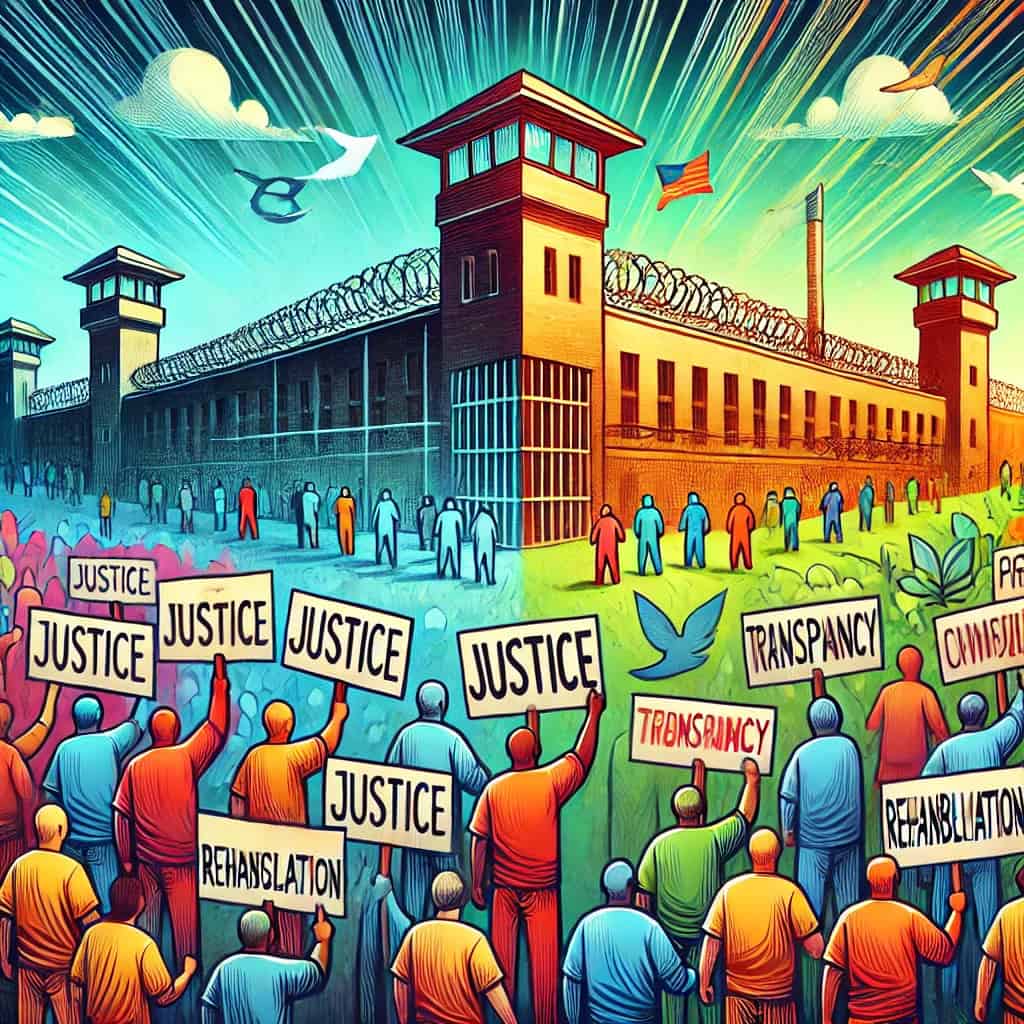
Ethical Failures of the System
Profiting from punishment fundamentally undermines the purpose of a justice system. Instead of focusing on rehabilitation, fairness, and public safety, the prison-industrial complex prioritizes revenue generation. This creates a moral paradox: how can a system designed to administer justice be just when financial incentives drive its decisions?
The ethical failures extend beyond the walls of prisons. Families are drained of their resources to support incarcerated loved ones, prisoners face inhumane conditions, and taxpayers unknowingly fund a system that prioritizes profits over rehabilitation. At its core, this is a failure of morality—a society that profits from the suffering of its most vulnerable cannot claim to uphold justice.
The Need for Transparency and Accountability
To rebuild trust and prioritize humane treatment, transparency is essential. Georgia’s Department of Corrections, shielded by laws exempting it from audits and independent oversight, must be held accountable. Independent audits of all prison-related services, from healthcare to commissary operations, can illuminate financial abuses and ensure that taxpayer dollars are used responsibly. Transparency also requires accurate reporting of prison conditions, including violence, deaths, and living standards.
Reducing Financial Burdens on Families
The financial exploitation of inmates and their families must end. Reforming commissary pricing, eliminating exorbitant fees for phone calls and electronic monitoring, and removing burdensome parole and probation fees would provide relief to families already struggling to support incarcerated loved ones. These measures are not just about fairness; they are about breaking the cycles of poverty and recidivism that the current system perpetuates.
Investing in Rehabilitation and Education
Rehabilitation must become the centerpiece of Georgia’s prison system. Investing in vocational training, education, and mental health services can drastically reduce recidivism rates. Programs that provide inmates with the tools to reintegrate into society are not just beneficial for individuals—they are essential for public safety. Data shows that inmates who participate in educational programs are far less likely to reoffend, yet Georgia’s prisons allocate minimal resources to these initiatives. Reform means prioritizing rehabilitation over punishment.
Leveraging Technology for Advocacy
Platforms like ImpactJustice.AI represent a groundbreaking approach to prison reform advocacy. By simplifying the process of creating and sending personalized messages to lawmakers, ImpactJustice.AI empowers individuals to demand change. This tool leverages data from the DOJ reports, media investigations, and GDC statistics to craft impactful messages, enabling advocates to focus on the issues that matter most.
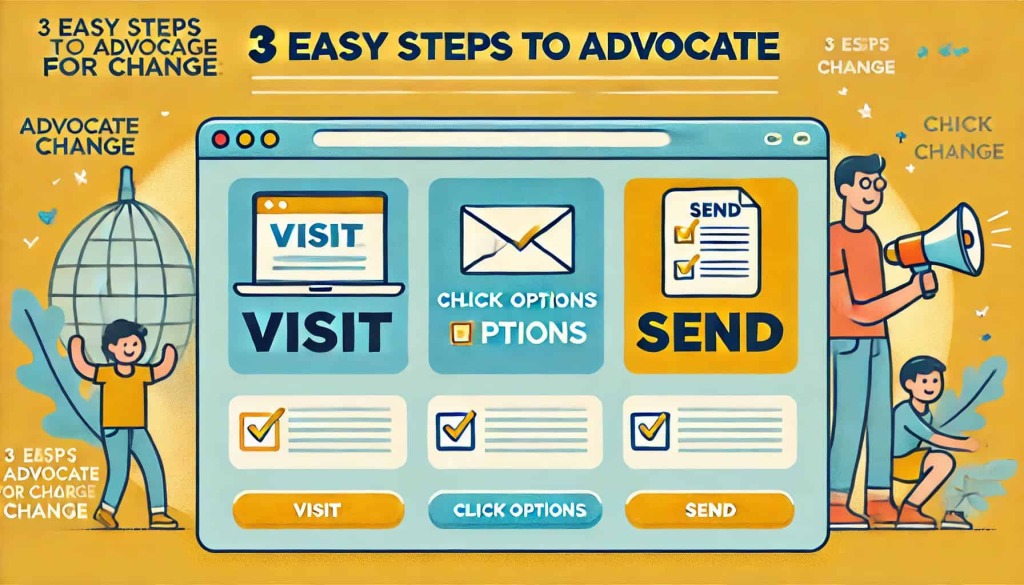
Technology also plays a crucial role in amplifying the voices of inmates and their families. Social media campaigns, virtual town halls, and online petitions can bring national attention to the systemic failures of Georgia’s prison system, creating momentum for legislative action.
Proposed Reforms
1. Mandatory Transparency: Enforce laws requiring independent audits and public disclosure of prison operations.
2. Fair Pricing Policies: Regulate the costs of commissary items, phone services, and parole/probation fees to eliminate financial exploitation.
3. Rehabilitation Investments: Allocate funds for education, mental health care, and job training programs to prepare inmates for successful reintegration.
4. Legislative Advocacy: Support policies that reduce sentencing disparities, reform parole systems, and prioritize decarceration for nonviolent offenders.
XI. Conclusion: The Urgent Need for Justice Reform
The prison-industrial complex is a stark reminder of what happens when profit motives intersect with the justice system. As we have seen, the pursuit of financial gain has corrupted the system at every level, creating a cycle of exploitation, neglect, and inhumanity. From the manipulation of sentencing laws to the exploitation of inmates and their families, the current system prioritizes profit over rehabilitation, public safety, and human dignity.
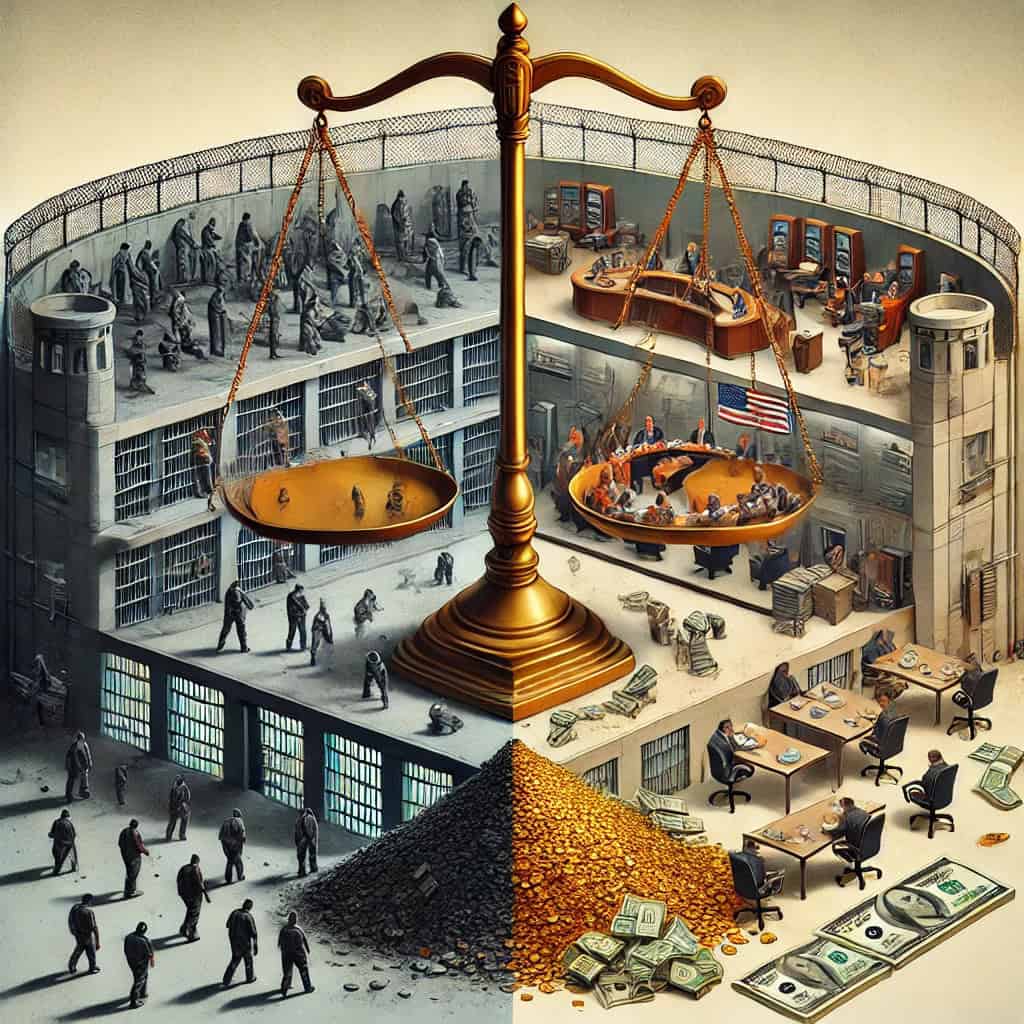
This is not just a failure of policy—it is a moral crisis. Georgia’s prisons, emblematic of these systemic failures, highlight the devastating consequences of a profit-driven justice system. Violence, overcrowding, and neglect are symptoms of a deeper issue: a system that values revenue over reform. The victims of this corruption are not just the inmates but their families, communities, and taxpayers who unknowingly fund this broken machine.
A Call to Action
Reform will not happen without public demand. Every individual has the power to contribute to change by contacting lawmakers, supporting advocacy organizations, and raising awareness. The tools exist—like ImpactJustice.AI—to make your voice heard. The question is, will we use them?
Georgia’s prison system is at a crossroads. The choice is clear: continue profiting from punishment or prioritize justice and humanity.
The time for action is now
We cannot wait for another report, another scandal, or another tragic death to ignite reform. Transparency, accountability, and humane treatment must become the cornerstones of Georgia’s prison system. These changes will not only restore justice but also ensure public safety and break the cycles of poverty and crime that plague our communities.
Reform begins with you. Your voice matters. Contact lawmakers, demand transparency and independent audits, and advocate for policies that prioritize rehabilitation over punishment. Tools like ImpactJustice.AI make it easier than ever to hold the system accountable and push for meaningful change.
The Path Forward
This is not just about fixing a broken system—it’s about redefining what justice means in Georgia and across the United States. It’s about ensuring that the justice system serves its true purpose: protecting society, upholding fairness, and providing second chances. Together, we can dismantle the prison-industrial complex and build a system rooted in humanity and hope.
Georgia’s prisons can no longer be places of profit and punishment. They must become institutions of rehabilitation, justice, and redemption. The choice is ours, and the time is now.

2 thoughts on “Justice for Sale: The Ethics of Georgia’s Prison System”